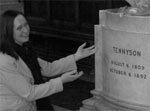
sinks into chaos
pictures falling angels
encounters the early
poems
on
wonder
makes heavenly
music
tackles Satan's
rhetoric
crosses
the shades of death
on the
long road ahead
hears the call of
Lycidas

on Milton's soaring
Muse
sympathises with Sin
searches out new
worlds
|
MEET THE CONTRIBUTORS
We asked all of our contributors to tell us about their favourite lines of Milton and their experiences of reading his work.
Ruth Rushworth
I thence
Invoke thy aid to my advent'rous song,
That with no middle flight intends to soar
Above the Aonian mount, while it pursues
Things unattempted yet in prose or rhyme.
~Paradise Lost, I.12.
'Advent'rous' is a particularly apt word to apply to this epic; its subject matter is ambitious, even potentially blasphemous. In this opening section of Paradise Lost, Milton is concerned not only to introduce his subject (and of course to engage his reader's attention), but also to secure a valid source of inspiration. He might even be accused of arrogance here for he is attempting to go beyond all previous epics, to do what no man has done before: 'things unattempted'. This epic marks for English literature a similar feat to that of the first man on the moon. Or rather, it is as if Milton had just landed on Mars while the rest of the world was still stuck on the moon. The Aonian mount is the home of the Classical Muses which provides adequate inspiration for Homer and Virgil, however, Milton aims even higher than this: 'intends to soar | Above', partly by transposing the epic genre from a pagan to a Christian sphere. Milton is almost sticking two fingers up at Classical tradition. The final line of this extract mocks and challenges the Italian poet Ariosto, who makes a similar boast at the beginning of his work Orlando Furioso. Milton steals Ariosto's words and makes them serve his own purpose in this battle of literary canons. His thundering blank verse is a poetic mode specifically not 'in prose or rhyme', and thus Milton also goes beyond previous English efforts. The bold audacity of Milton's work is sanctioned by his appeal to his God (in preference to the Classical Muses), as he prays for the necessary help to enable him to achieve literary success. Of course, his prayers are answered, as such invocations always are. The very fact that Milton already has a pen in his hand (or rather a pen in his scribe's hand) indicates that he already has God on his side. And with God as his patron, it is peculiarly difficult for readers to argue with this epic, or we risk aligning ourselves with the forces of evil in this poem: Satan and his rebel angels.
|

Writer, Editor.
Ruth is teetering on the edge of her third and final year of studying English at Christ's College, Cambridge. Having completed a dissertation on speech acts in Paradise Lost in her second year, she is now indulging herself with a dissertation on Tennyson and another on Middlemarch.
Milton's language
|


